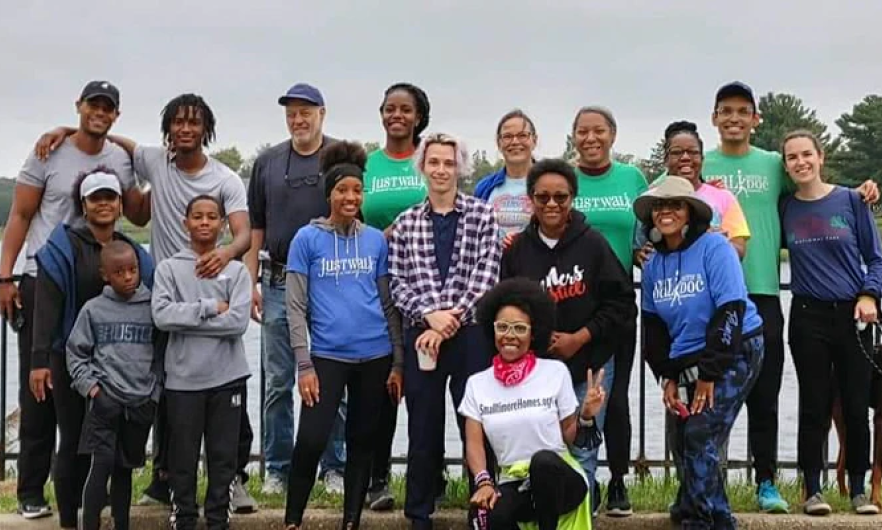The Voltrinas & “Walk With A Doc”

By Patrick Slavin, UHI Communications Associate
Health equity is not just about improving the quality, accessibility, and affordability of health care. It’s holistic and cross-cutting, Lisa Cooper, MD, MPH argues in her book “Why Are Health Disparities Everyone's Problem?” (Johns Hopkins Wavelengths).
“Not having access to healthy food or effective education, multiple generations living crowded in small houses, having to rely solely on public transportation to travel to essential jobs that pay low wages and offer few benefits, and having less access to health care, both financially and geographically” are some of the reasons for existing health disparities in Baltimore and throughout the world, writes Cooper, Director of the Johns Hopkins Urban Health Institute (UHI) and the Johns Hopkins Center for Health Equity.
This is what has motivated a dynamic team of six women community activists in Northeast Baltimore, who with smiles refer to themselves as Voltrina, based on the cartoon superhero Voltron. All are UHI Bunting Neighborhood Leadership Program (BNLP) Fellows who are building healthier lives through a weekly community wellness program around Lake Montebello featuring Walk With A Doc.
Established in 2016, the BNLP is a one-of-a-kind initiative that aims to equip the next generation of Baltimore’s community activists with the knowledge, skills, and tools to be transformative leaders.
“If it's building community, I’m down for it,” said Atiya Wells. Wells is the Executive Director of Backyard Basecamp/Bliss Meadows and a 2021 BNLP Fellow responsible for bringing the first Walk With A Doc Chapter to Baltimore. Backyard Basecamp is a non-profit organization that works to connect Black, Indigenous, and People of Color to land and nature in Baltimore.
“The health and wellness of communities of color in Baltimore will be built by community-based solutions and through sharing. That’s why we started Walk With A Doc in 2019,” said Wells, 34.
Wells, a pediatric nurse with an affinity for health, wellness, and the outdoors, could not launch the program initially because of the COVID pandemic. She connected with her Bunting Fellows peers when people started to feel more comfortable engaging with one another. They officially started the walks in October 2021 and stopped just before Christmas. They restarted the walks this spring.
“Every Sunday morning, we walk around the lake with community members, and a doctor or healthcare specialist gives a short talk, and then we continue the conversation during the 1.4-mile loop,” said Nicola Norman, the project’s Integrative Health Coordinator, and a 2021 BNLP Fellow. “Just to be able to connect with people again with the pandemic has been very special. It’s also special working with the women leading Walk With A Doc. Most of us were inspired by the late Bishop Miles, and we call ourselves the Voltrina. We are a powerhouse.”
Last year, Bishop Douglas Miles passed away. He was a giant in Baltimore, serving as a community organizer, pastor, and leader of the Bunting Fellows Program
Norman, 34, and other Walk With A Doc leaders were featured at UHI’s 2022 Social Determinants of Health Symposium.
Walk With A Doc Program Coordinator and 2021 BNLP Fellow Kadija Hart said the work is a labor of love. Hart coordinates the community wellness programs for Backyard Basecamp.
She shared that the group walks every Sunday instead of once a month as initially designed because participants look forward to coming regularly. The health talks cover many topics important to community members, including diet and nutrition, smoking cessation, and mental health. “We also distribute produce boxes and provide community resources,” said Hart, 42, who plans to expand the program to other parts of Baltimore and add blood pressure screenings.
“There are many barriers to equity and healthcare, including fear and distrust of doctors. It’s real,” she said. “Having doctors and other health professionals join us in an informal setting helps break down those barriers and allows the community to get useful information needed to improve their health.”
Norman noted, “The response from the community has been really positive…We’re not outsiders, we’re from the community. You can feel trust is there.”
